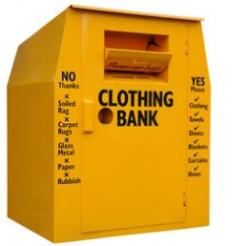Companies operating clothing collection bins for charities may not be required by law to disclose how much they profit from the charity collection, Civil Society has learned.
While the Salvation Army is now rolling out disclosure statements for all of its clothing collection bins operated by Kettering Textiles following a media furore surrounding the charity's relationship with the for-profit company, Helen Harvie, a consultant specialising in charity law at Barlow Robbins LLP, believes that it is not clear whether this is strictly required by law.
"One of the problems is that the legal requirements relating to fundraising statements are very much focused on professional fundraisers and what are called commercial participators," she said. "A commercial participator is usually a commercial company that is selling its own goods and services but promoting them by using the branding of an associated charity and saying, 'by the way, a percentage of the profits will go to this charity'."
The agreement between Kettering and the Salvation Army does not strictly fall within these definitions.
"For a start [Kettering] is not really selling goods and services to the general public. They're collecting donated goods and either delivering them to Salvation Army shops or selling them on elsewhere for the benefit of themselves and the charity.
"The charity describes Kettering as a 'contractual partner'. The marketing or promoting is being carried out by the charity's trading arm rather than the commercial partner. It's not quite the same scenario," said Harvie.
Written agreements
"What is required is that there should be a written contractual agreement between the two parties, which almost certainly there will be. The contents of that contract are not disclosable to the general public. Disclosure of the arrangement would normally be made by the commercial partner but in this case is being made by the charity. The profit split was already disclosed on their website. If the legislative requirements do apply, the disclosure should be of an estimated sum rather than a percentage split of profits."
There is no indication that disclosures relating to contractual partners in fundraising will be considered in the general review of the Charities Act 2006 which is due to be conducted later this year.
The Charity Retail Association, which produces the code as it pertains to commercial collections in charity bins, advises that charities adhere to the disclosure requirements outlined in law but does not state that collections should break the details of how the profits from collections are shared. It also warns that charities ensure they are getting the best possible returns from their arrangement with a commercial partner.
With particular regard to bins, the association's Code of Charity Retailing 2011 - 2012 says: "Where stock collected in banks is not intended for sale in charity shops, this should be clearly stated on the banks."
It adds: "Members ought to be aware that these partnerships might be seen to conflict with the core charity retail objective (the sale of donated goods in-store to maximise income for the charity). Members should also consider the reputational risks to their charity - and to the sector more generally - of being involved in activities which might be seen to undermine this objective, or which might damage the public's trust and confidence in the sector."









